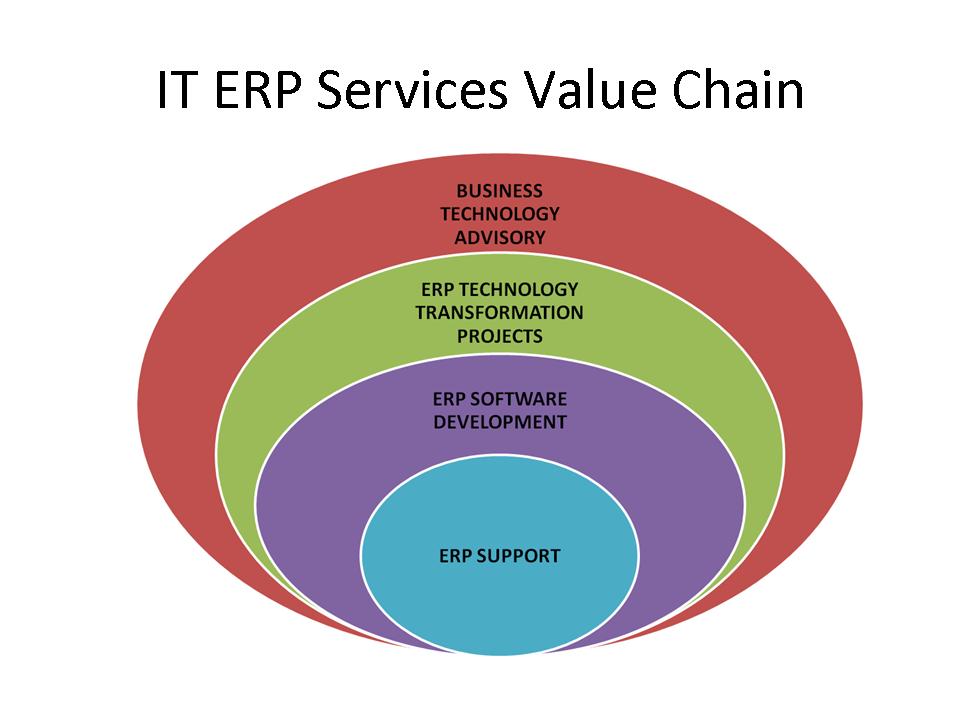A key challenge in my role as an IT ERP Director was to maximize business value with a shrinking budget. It was quite an education for a person with the majority of his experience in Tier I ERP Consulting. There are many options competing against IT organizations in providing ERP services (SaaS, Cloud, Off-shore and Near-Shore support models). Two key battlegrounds are ERP software development for customizations and ERP support.
Show me an IT organization whose key competitive advantage is that they are internal and I will show you a shrinking IT department! There must be a major shift in IT’s value proposition for ERP support. In the next sections we will discuss some of the shifts IT ERP shops need to make to stay competitive and relevant.
IT ERP Support Can Be Done Cheaper
For the purpose of this blog discussion let’s broadly assume that there are three tiers of ERP support.

There has been much discussion regarding outsourcing IT support along with noted advantages and disadvantages. I will not join the debate on one side or the other but I do consider myself a realist. Generally speaking, you are looking between 30% to 50% reduction in costs (depending on the study) which just can’t be ignored. Instead of fighting the change I prefer to control the change in such a manner as to enable my ERP IT support team to generate greater value for our customers.
Also, consider that there are just some activities you should not outsource. Referring to above model I have been very cautious with outsourcing Tier I support. Nothing is more reassuring to a business user with a critical issue than to see their IT support partner face to face and have a real-time discussion. Cost cannot be the only consideration – just like Dell learned the hard way. If the activity is not strategic and highly valued by your customer then look for a cheap and competent (not world-class) option that will free your IT resources for greater value-add activities.
Trend: Competitive Advantage for ERP is Configuration over Customization
With the initial release of ERP, one of the key “game changers” was the ability of business users to access data and generate reports without direct IT involvement. This empowerment of the business user had a significant impact on business agility. Today, we continue to see ERP vendors focus on providing business-friendly tools for reporting and analysis.
Yet, I can see a new evolution brewing in the ERP industry what I like to call “Adaptive ERP” where business users will be able to perform on-demand configurations to meet business changes real-time. This would go way beyond simple user preference configurations. Adaptive ERP would enable business users to configure, simulate, test, and implement business technology changes with limited traditional IT services (ex. software development). Today, some Tier I ERP vendors provide some limited capabilities of Configurable ERP but these capabilities are spread across multiple software products and OS platforms. It’s a great topic for discussion (and future blog) but not what I would consider a sustainable, viable solution for today.

Advice for ERP IT Departments – Focus on Moving up the Value Chain
In my previous experience, I had an opportunity to work for a Tier I ERP vendor developing new service offerings and consulting practices. A key lesson I learned the hard way was when a service offering is facing significant commodity pressures either you can (a) reduce the cost or (b) move up the value chain where you can generate a strategic competitive advantage.

In order to move up the value chain not only will include training but more importantly a fundamental change in what IT considers their strategic business value. Remember that a key value proposition for ERP is to reduce software development. Therefore, software development should not be the key IT value proposition for the IT ERP team. Many perceptions and expectations must be carefully managed through this organizational transition. The goal is to evolve IT software developers into IT business technology advisors. One only needs to look at the ERP professional services industry to observe what the market will bear for software development roles versus technology advisory roles to confirm the above recommendation. With this move, internal IT organizations will be able to support more advisory and consultative roles once reserved for external consulting organizations. Just think of the potential cost savings and knowledge retention to your business.
Summary
Is this the end for internal IT support for ERP? Hardly! However, more will be asked of internal ERP support teams with limited resources. This may result in a more challenging and stressful work environment. What use to be considered valuable has become generally accepted and expected from business users. To remain a strategic partner, IT ERP support teams should look for opportunities to free up their staff to focus higher up the value chain.
Join the community! 16k followers across 100 countries!


Leave a Reply